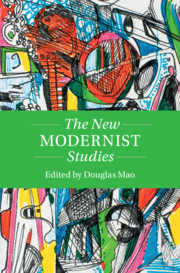Book contents
- The New Modernist Studies
- Twenty-First-Century Critical Revisions
- The New Modernist Studies
- Copyright page
- Dedication
- Contents
- Figures
- Notes on Contributors
- Acknowledgments
- Introduction
- I Histories
- II Horizons
- Chapter 3 Planetarity’s Edges
- Chapter 4 Religion’s Configurations
- Chapter 5 Disability’s Disruptions
- Chapter 6 Affect’s Vocabularies
- Chapter 7 Invisibility’s Arts
- Chapter 8 Black Writing’s Visuals
- Chapter 9 Noir Film’s Soundtracks
- Chapter 10 Language’s Hopes
- Chapter 11 Revolution’s Demands
- Chapter 12 Feminism’s Archives
- Chapter 13 Risk’s Instruments
- Chapter 14 Deep Time’s Hauntings
- Bibliography
- Index
Chapter 10 - Language’s Hopes
Global Modernism and the Science of Debabelization
from II - Horizons
Published online by Cambridge University Press: 21 January 2021
- The New Modernist Studies
- Twenty-First-Century Critical Revisions
- The New Modernist Studies
- Copyright page
- Dedication
- Contents
- Figures
- Notes on Contributors
- Acknowledgments
- Introduction
- I Histories
- II Horizons
- Chapter 3 Planetarity’s Edges
- Chapter 4 Religion’s Configurations
- Chapter 5 Disability’s Disruptions
- Chapter 6 Affect’s Vocabularies
- Chapter 7 Invisibility’s Arts
- Chapter 8 Black Writing’s Visuals
- Chapter 9 Noir Film’s Soundtracks
- Chapter 10 Language’s Hopes
- Chapter 11 Revolution’s Demands
- Chapter 12 Feminism’s Archives
- Chapter 13 Risk’s Instruments
- Chapter 14 Deep Time’s Hauntings
- Bibliography
- Index
Summary
Twenty-first century paradigms of global modernism implicitly endorse “babelization” (the inscrutable styles of literary texts, the addition of lesser taught languages to the field) as a corrective to linguistic imperialism and the reduction of language to a communicative medium. Yet this stance does not fully account for the distinction between natural and artificial languages. “Debabelization,” as linguist C. K. Ogden put it in 1931, motivated rich debates about the nature of language and whether technological intervention could make particular languages more efficient agents of cultural exchange. Designers of Esperanto, Ido, and Basic English each promised that their artificial language would bridge the gap between speakers of different national tongues. This essay shows how the competitive and techno-utopian discourse around auxiliary language movements intersects with the history and aesthetics of modernist literature. While linguists strove to regulate the vagaries of natural languages, modernist writers (for example, Aimé Césaire, G. V. Desani, James Joyce, Ezra Pound, H. G. Wells) used debabelization as a trope for exploring the limits of scientific objectivity and internationalist sentiment.
Keywords
- Type
- Chapter
- Information
- The New Modernist Studies , pp. 200 - 224Publisher: Cambridge University PressPrint publication year: 2021

